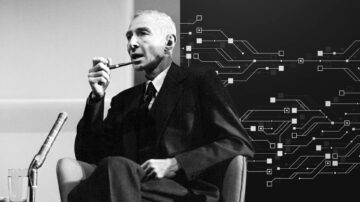Ashutosh Jogalekar and Charles Oppenheimer at Fast Company:
 A few days after the atomic bombs were dropped on Hiroshima, Robert Oppenheimer (one of the author’s grandfather) wrote in a letter to his old teacher, Herbert Smith, that “the future, which has so many elements of high promise, is yet only a stone’s throw from despair.” The promise that Oppenheimer was talking about was the promise that the horror of nuclear weapons might abolish war. The despair that he was talking about was the despair that mankind may not be wise enough to handle this millennial source of power without destroying itself.
A few days after the atomic bombs were dropped on Hiroshima, Robert Oppenheimer (one of the author’s grandfather) wrote in a letter to his old teacher, Herbert Smith, that “the future, which has so many elements of high promise, is yet only a stone’s throw from despair.” The promise that Oppenheimer was talking about was the promise that the horror of nuclear weapons might abolish war. The despair that he was talking about was the despair that mankind may not be wise enough to handle this millennial source of power without destroying itself.
In 1946, Under-Secretary of State Dean Acheson asked the Chairman of the Tennessee Valley Authority and soon-to-be Chairman of the Atomic Energy Commission, David Lilienthal, to compose a report analyzing the threat of nuclear weapons and proposing a plan of action for the United States to present to the newly created United Nations. As scientific and industrial counsel, Lilienthal appointed Oppenheimer and a small team of consultants to advise him and craft the report.
Unofficially led by Oppenheimer as the one with the most knowledge, the committee came up with a proposal that presented the peculiar juxtaposition of being both radical and logical. The Acheson-Lilienthal Report was presented to the president and secretary of state in March 1946.
More here.
Enjoying the content on 3QD? Help keep us going by donating now.
